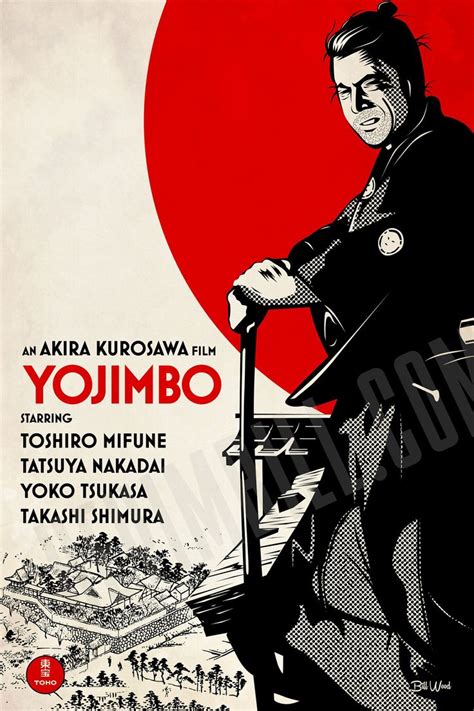Yojimbo
directed by: Akira Kurosawa, year: 1961
actors: Toshiro Mifune, Tatsuya Nakadai, Yoko Tsukasa, Takashi Shimura
actors: Toshiro Mifune, Tatsuya Nakadai, Yoko Tsukasa, Takashi Shimura

Description:
Yojimbo centers on a wily ronin who enters a corrupt frontier town ruled by two rival gangs. He feigns neutrality and then plays the factions against each other with clever ruses, sharp wit, and swift, brutal action, cutting a path toward his own survival while testing the town’s code of honor. Kurosawa’s stark visuals, precise pacing, and moral ambiguity fuse samurai cinema with Western myth, creating an influential story about cunning, violence, and survival.Keywords:
Edo Period, Samurai, Crime Drama, Western Influenced, Jidaigeki, Historical Action, SwordsmanshipWhat does Yojimbo mean in Japanese?
"Yojimbo" translates to "bodyguard" in Japanese. The term is derived from "yo" (用), meaning "use" or "to employ," and "jinbo" (人保), which means "person" or "man." In the context of the film, it refers to the main character, a wandering samurai who takes on the role of a protector amidst a conflict between rival factions in a small town. Directed by Akira Kurosawa and released in 1961, "Yojimbo" has had a significant influence on the samurai film genre and Westerns.
Is a fistful of dollars a ripoff of Yojimbo?
Yes, "A Fistful of Dollars" is considered a loose remake of Akira Kurosawa's "Yojimbo." Both films feature a lone, cunning samurai (or gunslinger) who manipulates two rival factions for his own gain. When Sergio Leone directed "A Fistful of Dollars," he was heavily inspired by "Yojimbo," which led to legal disputes with Kurosawa. While "A Fistful of Dollars" shifted the setting to the American West and adapted the narrative style, the core premise remains similar, showcasing the influence of Kurosawa's work on Western cinema.
Is Django a remake of Yojimbo?
Yes, "Django" (1966) is often considered a loose remake of Akira Kurosawa's "Yojimbo" (1961). Both films feature a lone protagonist who manipulates two rival factions for his own benefit. While "Yojimbo" is set in feudal Japan and follows a samurai, "Django" is a Spaghetti Western with a gunfighter as its central character. The influence of "Yojimbo" on "Django" is evident in the plot structure and themes of betrayal and cunning. However, "Django" has its own distinct style and narrative elements that set it apart.
Is Yojimbo a sequel to Sanjuro?
No, "Yojimbo" is not a sequel to "Sanjuro." In fact, "Yojimbo," released in 1961 and directed by Akira Kurosawa, is the first film featuring the character of Sanjuro, played by Toshiro Mifune. "Sanjuro," which was released in 1962, is a direct sequel to "Yojimbo," continuing the story of the wandering samurai. Both films are based on the works of Dashiell Hammett and are notable for their influence on the samurai genre and Western films.
Explore More Categories: